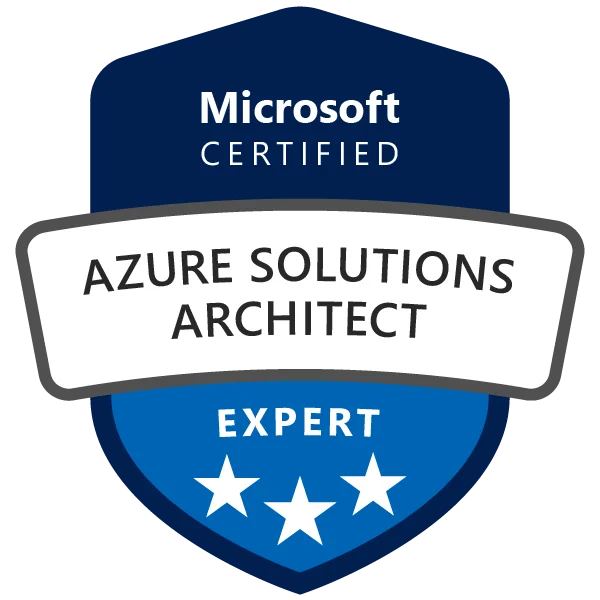




Attend all the top-notch LIVE Instructor-led Courses you want for the price of less than one course.


course: Microsoft Certified Azure Solutions Architect (AZ-305)
Duration: 4 days
Format: Virtual or Classroom


Overview
Become a proficient Azure Solutions Architect with our specialized course. Learn to design scalable and reliable cloud solutions using Microsoft Azure. From architecture design to implementation, this course covers all aspects of Azure solution development. With hands-on labs and expert guidance, you'll gain the skills needed to pass the AZ-305 exam and become certified as a Microsoft Certified Azure Solutions Architect. Enroll now to get certified and elevate your career in cloud computing.
 Instructor-led training
Instructor-led training
 Practice test
Practice test
 Pre-reading
Pre-reading
 Personal Learning Path
Personal Learning Path
 Certification Guarantee
Certification Guarantee
 Email, chat and phone support
Email, chat and phone support










Who is this course for?
The Microsoft Azure Solutions Architect (AZ-305) certification exam is for IT professionals and cloud architects with experience in designing cloud infrastructures using Microsoft Azure services. As part of the Azure Solutions Architect Expert certification track, the exam covers various aspects of designing Azure solutions, including infrastructure design principles, compute services, networking, storage solutions, identity and security, data platform solutions, monitoring, and hybrid cloud integration. Passing the exam demonstrates the candidate's ability to design reliable, scalable, and secure cloud infrastructure solutions tailored to specific business needs.
Curriculum
Preparation
At Readynez, we provide many resources and have experienced experts in the field. That is why we are also very successful with many satisfied customers. You can therefore safely take your course with us. In order to take the AZ305 course, however, some prerequisites are required.
You have the perfect starting point to take the course with these prerequisites:
Meet some of the Readynez Instructors you can meet on your course. They are experts, passionate about what they do, and dedicated to give back to their industry, their field, and those who want to learn, explore, and advance in their careers.

Tiago Costa is Microsoft MVP and a Cloud Architect and Advisor and International speaker on the Microsoft Cloud.
Tiago Costa is a Cloud Architect and Advisor on Microsoft Azure. For the past years he has been architecting and developing solutions using Microsoft Azure for some of the fortune 500 companies.
Due to his strong real-world experience, Tiago regularly teaches Microsoft Azure classes around the world. Microsoft Azure MVP since 2016 for his community efforts in promoting and sharing knowledge with the community.
Tiago has 40+ Microsoft Certifications including MCT – Microsoft Certified Trainer - and got awarded as MCT Regional Lead every year since 2016. He’s the founder of the Azure Portugal User Group. He loves diving into new technologies and to share his experience at conferences and training classes, but what excites him about his work is to help others exploring new frontiers in technology impacting their life’s, making the world a better place for everyone. His free time is spent with his family in the sunny Lisbon, Portugal building cool and geek projects

Ed is a Microsoft MVP for many years and has authored several Microsoft Official Curriculum Courses for Azure, Windows Server and Windows.
He is a 25 year IT veteran with experience in the UK Police and armed forces. Ed is a former Microsoft Technical Evangelist and is an MCT Regional Lead for the UK and he currently holds the most prestigious Microsoft MVP accreditation. Ed also helps run the UK MS Cloud User Group and the annual Evolve Conference in the UK.
Ed has authored several Microsoft Official Curriculum Courses for Azure, Windows Server and Windows as well as writing courses for Opsgility and other online providers.
Ed is a regular conference speaker at events such as TechEd, Ignite, TechSummit, SpiceWorld and more.
Ed now spends his time mixed between teaching Microsoft Azure, Windows Server and Enterprise Mobility topics. In addition Ed provides consultancy services to Small and Medium Enterprises as well as direct to Microsoft UK and Microsoft Corp.

Jens is a 20-year MCT, an Amazon Authorized Champion Instructor and a well accomplish Cloud Infrastructure Security Consultant and Penetration Tester.
Jens Gilges is a highly skilled professional with expertise in Azure, AWS, and Penetration Testing. With a remarkable 20-year tenure as a Microsoft Certified Trainer (MCT), Jens has honed his proficiency in various Microsoft technologies. Notably, he is not just a trainer but an industry leader, holding the prestigious title of AWS Champion Instructor.
Jens is dedicated to imparting his knowledge globally, delivering top-tier security and AWS training to clients across the world. His passion for these cloud platforms shines through in his engaging and informative sessions. Whether you're seeking insights into Azure's versatile capabilities, AWS's vast infrastructure, or the intricacies of Penetration Testing, Jens is your go-to expert.
With Jens at the helm, you can expect a comprehensive learning experience that combines years of expertise with a commitment to staying at the forefront of cloud technologies. Join him on a journey of continuous learning and explore the ever-evolving landscapes of Azure, AWS, and Penetration Testing.
FAQ
The AZ-305 certification exam by Microsoft assesses the proficiency of Azure Solutions Architects. This certification is centered on verifying the capabilities and understanding necessary for devising and deploying solutions on Microsoft Azure. It encompasses key areas such as security, governance, identity, networking, storage, computing, and monitoring.
Begin your AZ-305 certification journey at Readynez! Our in-depth course empowers individuals and teams to conquer the exam, guaranteeing certification triumph. Specializing in expert exam preparation, Readynez guides you towards an accomplished career in Azure. Enroll now to uncover the route to AZ-305 certification success. Your journey to becoming a certified professional starts here at Readynez.
The prerequisites for AZ-305 certification include a foundational understanding of Microsoft Azure services, solutions, and IT fundamentals. Familiarity with networking concepts, security, and proficiency in deploying and managing Azure solutions are recommended. Additionally, hands-on experience in Azure administration and a fundamental understanding of scripting and automation can be beneficial for success in the AZ-305 exam.
Microsoft certification exams such as the AZ-305 certification exam typically range from €150 - €228.
The AZ-305: Designing Microsoft Azure Infrastructure Solutions exam and its syllabus measures your ability to accomplish the following technical tasks: design identity, governance, and monitoring solutions; design data storage solutions; design business continuity solutions; and design infrastructure solutions.
The value of the AZ-305 certification for your career depends on your professional goals and the role you aspire to in the field of Microsoft Azure. Certifications demonstrate expertise and may enhance your credibility with employers.
The time required to become AZ-305 certified varies depending on factors such as your prior knowledge of Microsoft Azure, your experience in cloud technologies, and the amount of time you dedicate to exam preparation. Typically, candidates engage in several weeks of focused study and hands-on practice before attempting the AZ-305 exam.
Most Microsoft certification exams such as the AZ-305 can be either taken online or through a certified Pearson VUE test center.
The difficulty of the AZ-305 exam can vary depending on your prior experience with Microsoft Azure, cloud technologies, and your overall familiarity with the exam content. This certification is designed for individuals with advanced knowledge and skills in implementing and managing Azure solutions.
To obtain the certificate, a minimum score of 700 out of 1000 is required, with a passing threshold of 70%.
Microsoft certifications such as the AZ-305 are valid for two years. To maintain your AZ-305 certification, you can either retake the current exam or take a new qualifying exam within that two-year period.
The salary for an individual with AZ-305 certification can vary based on factors such as experience, location, and the specific employer. Candidates in the United States can earn salaries within the range of €78,164 – €1,20,217 or more, with higher levels of experience and expertise generally commanding higher compensation.
Reviews

Great course to get a good understanding of the Azure Architecture and what areas to focus on. Awesome instructor, deep knowledge on Azure and an excellent way to explain complicated stuff.

Easy to attend over Teams and an excellent instructor gave me great value for the time I invested.
Why Pay More??
Why settle for just one certification course when you can attend ALL certification courses for the price of less than one single course?

A perfect tool to help us develop the skills and competencies we need for success
 Kasper Meyer Christensen
Kasper Meyer Christensen
Businesses leveraging Readynez Unlimited save at least 50% on their training and certifications - and many up to 80%
Unlimited license holders attend on average 2.4 courses per year

For the price of less than one course.

Just cheaper and more flexible.

The easiest, most flexible and cheapest way to get Certified.

Attend as many courses you want - no limitations!

Refund provided if license costs surpass the value of your training.

Interact 1-on-1 with 50+ seasoned instructors.